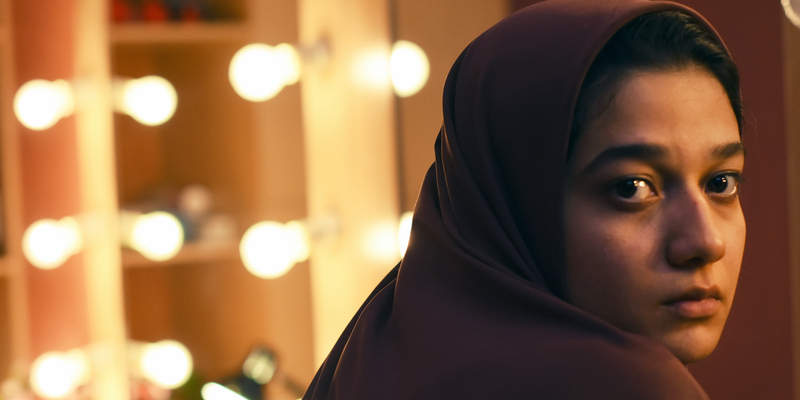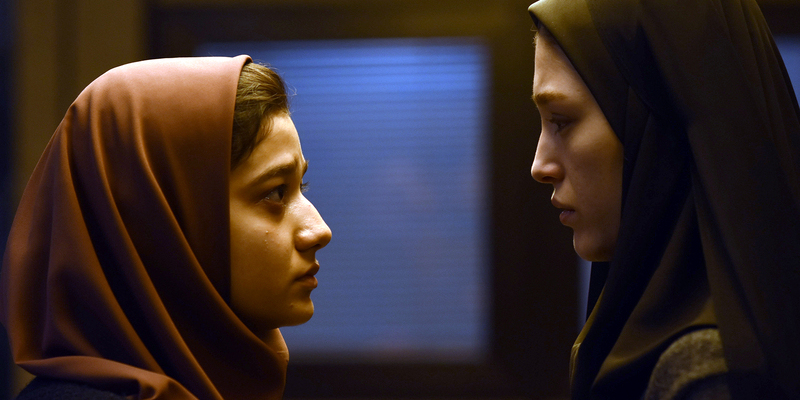
A young woman, convicted of murdering her husband, has her fate decided
by the victim’s family on a live television programme.
Review by
Musanna Ahmed
Directed by: Massoud Bakhshi
Starring: Sadaf
Asgari, Behnaz Jafari, Babak Karimi, Fereshteh Sadre Orafaiy, Forough Ghajabagli, Arman Darvish

Suddenly, cancel culture (at least in the West) doesn’t look like a real
thing anymore. In Massoud Bakshi’s
Yalda, A Night for Forgiveness, the literal court of public opinion is used to decide between life or
actual death. In this gripping drama, a woman named Maryam (Sadaf Asgari) convicted of the murder of her significantly older husband must face
his daughter Mona (Behnaz Jafari) on a live television show and
have her fate decided by Mona’s will to forgive her, while millions of
viewers share their own verdicts by SMS votes.

An immaculately dressed host (Arman Darvish) manages the function,
encouraging the best contributions out of the subjects through direct
questions. He is considerate that snap judgements can’t be made within an
hour, and thus allows for breaks filled in by invited pop musicians who
perform their latest hits. It’s as much of a tabloid talk show as one can
be, except it determines whether an individual is sentenced to death or
not, all under the accord of Iran’s judicial system. And the wildest part
of this film is that it’s entirely based on reality - it’s a replica of an
existing Iranian TV programme called Mah-e-Asal.

Bakshi directs the story from a ubiquitous perspective, cutting between
the talk show, the crew working hard to ensure the production is smooth
running, family members backstage reacting to the dialogue between Mona
and Maryam, and the two leads anxiously waiting around whenever there’s a
pause in the broadcast. The value of dramatising an episode of Mah-e-Asal
allows for a closer, fascinating examination of characters, highlighted by
off-stage moments such as when Mona calls her friend and angrily expresses
how she really feels about Mona, and huge revelations around children.
The heightened reality of TV programming is offset by the director’s
commitment to staying grounded for the meta narrative: Bakshi doesn’t
employ any of the exaggerated music that the producers of the
fictionalised Mah-e-Asal employ, he’s sensitive with the dramatic twists,
and he doesn’t lose sight of the intimate focus on Mona and Maryam,
especially when there’s spectacle to be mined out of the producers’
efforts to ensure there aren’t any issues behind the scenes. However, even
though the filmmaker is fit to tell the story, it’s the actors who make it
so powerful.

Asgari and Jafari are almost polar opposites in how they perform as Maryam
and Mona, respectively. The former plays Maryam at fever pitch, a boiling
point before the potential hysteria of learning she’s going to lose her
life. But during key moments of the episode’s development, Asgari
surprises us by lapsing into silence, accentuating her character’s
emotional journey more than words could. On the other hand, Jafari’s Mona
is hard to read with her numbed expressions until she gets closer to
realising the colossal impact of an eye for an eye, a costly idea
according to her lawyer. Both performances are deeply sympathetic,
complicating the dilemma of forgiveness that we know too well through the
average revenge narrative. No amount of blood money can bring somebody
back... is it worth pursuing the cost of another life?

Yalda, a Night for Forgiveness is in US
virtual cinemas now. A UK/ROI release has yet to be announced.

